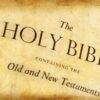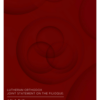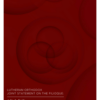Problematizing a Development of Sacra Doctrina within the Church: With Reference to Peter of John Olivi
Bernard McGinn writes the following with reference to the apocalyptic-theology-of-history present in the mediaeval theologian, Peter of John Olivi’s (c. 1248—1298) thought: The invective Olivi directs against the evidences of the carnal Church is concerned not only with the ecclesiastical abuses of the day, especially with avarice and simony, but also, like Bonaventure before him, with the use of Aristotle in theology. The Provençal Franciscan also expressed belief in a double Antichrist—the Mystical Antichrist, a coming false pope who would attack the Franciscan Rule, and the Great, or Open Antichrist, whose defeat would usher in the final period of history….
2025 Disability Ministries Grants
Greetings from ELCA Disability Ministries! Today would like to announce that the applications for our next cycle of grants will open on Thursday, May 15th, and close on July 31st. Projects receiving grants will be announced by the end of October 2025. For more information on the details regarding registration and eligibility/expectations for grant proposals, please go to: https://www.elca.org/our-work/grants/impact-church-ministry and scroll down to “Disability Ministries” . If questions arise, please contact our coordinator, Rev. Lisa Heffernan at disability.ministry@elca.org. We are excited to learn what your communities are dreaming up for 2025! God’s peace and blessings to you in this spring…
May 4, 2025–Be With You
Catalyst Question When you greet your friends, how do you first speak to or otherwise engage one another? This could be a phrase like “what’s up”, a special handshake, or other shared behavior. What does having this ritual indicate about your relationship? May the 4th Be With You This Sunday is a special holiday for a very specific segment of the population. For Christians who are also Star Wars fans, May 4th falling on a Sunday is a special occasion. Why is that? An artist’s rendering of the B1 Battle Droid, featured prominently in Episode III. “May The Force be…
Reading the Bible as a Christian: The Outer and Inner Reality of Scripture
Scripture has an outer logic and an inner logic. Back in the day this was referred to as its outer and inner clarity (perspicuity of Scripture). In some ways the rift between the disciplines of biblical studies and systematic theology pivots on which one of these the practitioner is focused on. That is to say, the biblical studies folks, typically focus on the outer components of the text; i.e., its grammar, philology, sitz im leben (e.g., historical situadedness), composition, transmission, and other “text critical” factors. Whilst the systematic theology folks focus more on the inner-theo-logic of the text; attempting to…
New Study Guide on the Joint Statement on the Filioque
This post is shared jointly on the Ecumenical and Inter-Religious Perspectives blog and the ELCA Worship blog. 1700 years ago, in 325, the first ecumenical council was convened in Nicaea to discern matters central to the Christian faith, namely: How do we understand Jesus Christ? The council sought to end disputes about the divine nature of Jesus, and his relationship to God in an attempt to unify all of Christendom. The end-result, later expanded in 381, was the Nicene-Constantinopolitan Creed – a clear articulation of the complexity of the faith. However, a later addition to the creed – the “filioque”…
New Study Guide on the Joint Statement on the Filioque
This post is shared jointly on the Ecumenical and Inter-Religious Perspectives blog and the ELCA Worship blog. 1700 years ago, in 325, the first ecumenical council was convened in Nicaea to discern matters central to the Christian faith, namely: How do we understand Jesus Christ? The council sought to end disputes about the divine nature of Jesus, and his relationship to God in an attempt to unify all of Christendom. The end-result, later expanded in 381, was the Nicene-Constantinopolitan Creed – a clear articulation of the complexity of the faith. However, a later addition to the creed – the “filioque”…
The Elect of God: Jesus, the Torah-Keeper
Interesting, as Jesus becomes human for us, and fully obeys and keeps the Torah (Law) for us, at the same time, because He is for us, He dies as if He hadn’t kept the Law for us, cursed, hung on a tree. And yet because He remained perfectly complete to the Law for us, all the way to suffering the consequences of no-Law-keeping, He is understood as simultaneously both the reprobate and elect of God for us in His consubstantial nature as fully God and fully Man for the world. There is a double election—an election for our reprobation and…
For what shall we pray?
“For what shall we pray?” is a weekly post inviting individuals, groups, and congregations to lift up our world in prayer. This resource is prepared by a variety of leaders in the ELCA and includes prayer prompts, upcoming events and observances, and prayer suggestions from existing denominational worship materials. You are encouraged to use these resources as a starting point, and to adapt and add other concerns from your local context. More information about this resource can be found here. Prayer prompts: For justice and peace among nations where war and violence rage, especially Ukraine and Russia, Palestine and…
April 27, 2025–Peace with a Purpose
Catalyst Question If you were living on a desert island for a year, with enough food and water to last indefinitely, what is one thing you would want to bring to make it the best life possible? Peace with a Purpose In John 20:19-31, a resurrected Jesus appears to his disciples twice. Often, when we read this passage, we focus on Thomas. He wasn’t present the first time Jesus showed up, and so was skeptical until Jesus appeared a second time. Some call him Doubting Thomas. Others emphasize Thomas’s devotion because he would only settle for the real Jesus and…
Theology as Discipleship
Be diligent to present yourself approved to God as a workman who does not need to be ashamed, accurately handling the word of truth. –II Timothy 2.15 For a long time, I’ve thought of reading and doing theology as an act of sanctification and discipleship. How else is the Christian supposed to act rightly (orthopraxis) without knowing rightly (orthodoxy)? These are bound together in a dialectical bundle whilst the one implicates the other, and vice versa. In short: without the work of prayerful and worshipful study before God there cannot be any Christian growth. When the disciple does a word…








